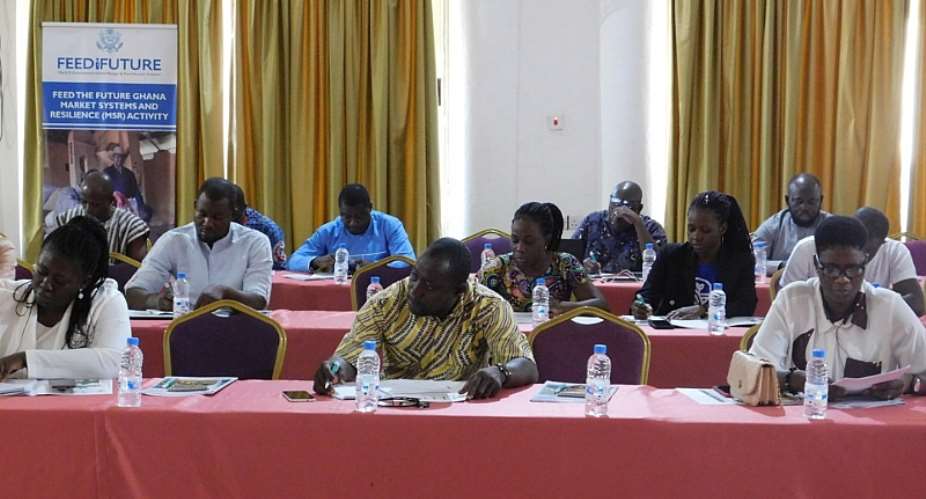The United States Agency for International Development (USAID) in collaboration with the Agricultural Cooperative Development International (ACDI), and the Volunteers in Overseas Cooperative Assistance (VOCA) have held a one-day public roadshow on the 6 million US dollar grant for prospective applicants in Tamale, the Northern Regional Capital.
The $6 million grant is under the Feed the Future Ghana Market Systems and Resilience (MSR) Activity programme, a five-year initiative programme aimed at increasing inclusive agriculture in northern Ghana.
The MSR Activity is a $35.9 million programme implemented by ACDI/VOCA, an international development non-profit organisation and funded by USAID.
The Tamale roadshow followed an earlier one held in Accra and was part of a series of others that would be organised in Bolgatanga, Wa and Nalerigu.
It was to ensure that potential grantees and other stakeholders understood what the Market Systems and Resilience grant was and the geographical zone it covered.
It was attended by both private and public entities including Non-governmental Organisations (NGOs).
The Deputy Chief of Party in charge of the Ghana MSR Activity, Council Osei in an interview, said the 6 million dollars was being offered as a grant for prospective applicants whose work focused on targeted crops such as maize, shea, Bambara beans, soybean, cowpea, groundnuts, moringa, mango and horticulture.
He also said the MSR Activity has many objectives and the key among them was to increase commercialisation, increase the institutional capacity of market actors, and improve market access and quality of business services.
He indicated that the grant mainly was targeted at women, young people and persons living with disabilities (PWDs) in the USAID’s 17-district zone of influence.
He explained that Farmer based organizations out grower businesses, including associations and/or co-operatives, village savings and lending associations, small and medium enterprises, private sector umbrella organizations Ghanaian non-governmental organizations, US non-governmental organizations, anchor firms (buyers. processors, exporters, etc), business service providers, selected public institutions including technical services organizations, and local government institutions were eligible for funding under MSR's Grant Program.
"The Grant Program will target private sector businesses and non-governmental organizations whose current work or businesses focus on the Activity's ten targeted crops (maize, shea, Bambara bean soybean, cowpea, groundnuts, moringa, mango and horticulture) in 17 designated districts across the Northern, North East, Upper West and Upper East regions," he said.
Mr Osei said Feed the Future was a US Government's initiative to end global hunger, led by USAID and driven by partnerships across public and private sectors, including 11 US Government agencies.
He added that 'Feed the Future' was addressing the root causes of poverty and hunger by boosting inclusive agriculture-led economic growth, resilience, and nutrition in countries with great need and opportunity for improvement.
Mr Osei was hopeful that the grant would facilitate the introduction of innovative ideas and improved practices and urged local and small NGOs to apply for the grant.
The MSR Grant Manager Wilberforce Freeman, in a presentation on the purpose, qualifications and application procedures, said prospective applicants must be registered entities, have adequate references on past performances, and have sound business management policies and procedures with internal controls that safeguarded assets.
Mr Freeman indicated that grantees may range from emerging businesses and groups who were working with donors for the first time, to well-established entities with a long history of implementing USAID-funded activities.
He said the programme was designed to help the grantees to be more resilient through supporting and empowering households, communities and businesses to predict, prepare for, withstand and recover from shocks in the agricultural market systems.
He stressed that applicants whose contributions supported any of the MSR Activity objectives with gender and social inclusion considerations and promoted climate-smart innovations or strategies had the highest chances of being selected.





 A/R: Achiase Chief arrested for acid attack on community members
A/R: Achiase Chief arrested for acid attack on community members
 Aggrieved butchers reject increment of slaughter fees, threaten street protest ...
Aggrieved butchers reject increment of slaughter fees, threaten street protest ...
 Naa Ayemoede returns to school
Naa Ayemoede returns to school
 Arrest “notorious” land guards terrorising land owners – Samuel Ayeh-Paye to Pol...
Arrest “notorious” land guards terrorising land owners – Samuel Ayeh-Paye to Pol...
 Dadieso residents block Accra-Kumasi highway
Dadieso residents block Accra-Kumasi highway
 Kasoa soldier killer remanded
Kasoa soldier killer remanded
 Rashid Pelpuo slams Opoku Prempeh for denying dumsor
Rashid Pelpuo slams Opoku Prempeh for denying dumsor
 Bawumia lacks new ideas, stealing from Mahama — Joyce Bawa alleges
Bawumia lacks new ideas, stealing from Mahama — Joyce Bawa alleges
 Societe Generale to exit Ghana, other African countries
Societe Generale to exit Ghana, other African countries
 May 4: Cedi sells at GHS13.99 to $1, GHS13.42 on BoG interbank
May 4: Cedi sells at GHS13.99 to $1, GHS13.42 on BoG interbank
